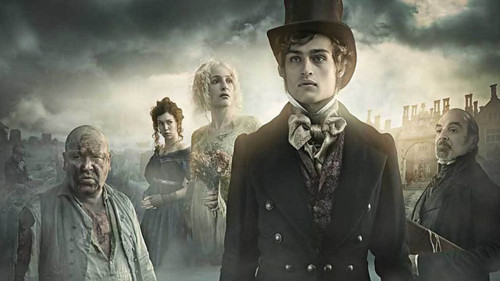Christmas brings all the usual things: bloated stomachs, reindeer jumpers, and an array of tired costume dramas. However, this year the BBC brought back Dickens’ ‘Great Expectations’ back to life in three episodes, and it was brilliant.

The novel is a ‘Bildungsroman’, a novel that charts the personal growth of the protagonist. Themes in ‘Great Expectations’ still relate very much to the modern world: pride, obsession, corruption, class and finally love and redemption. The dominant theme in the text is that of truly knowing oneself, which resonates with us today in a world that is constantly shifting and changing. It’s remarkable how Dickens never gets translated into the modern world adaptations unlike Shakespeare (Lenny Henry) and Austen (Clueless, Bridget Jones’ Diary). However, Sarah Phelps’ adaptation – directed by Brian Kirk – was original in its take on a well-known classic.
The opening was remarkable with Magwitch (played by the charismatic Ray Winstone) emerging mythical monster-like out of the depths of the slimy, misty lake. It felt more like middle earth than Dickens. Apart from a couple of slights ‘The law is a bastard’ instead of the original ‘The law is an ass’, it stayed pretty faithful to the text throughout.
One of the best things about this version was the astoundingly sinister performance from Gillian Anderson who played Miss Havisham. Though as a much younger character compared with the text there were a few touches that made Miss H as haunting as ever: blistered lips and a bad eczema condition made her utterly revolting. Her attempts to make her adopted daughter Estella the unattainable love interest for a young, impressionable Pip border on child abuse. He’s invited round to play but made to feel completely inadequate in every way. Miss Havisham controls when the games start and end. She gives Pip ideas above his station and then sends them crashing down in the same moment… ‘You are not a gentleman Pip. You are not a blacksmith – you did not finish your apprenticeship. You are merely the boy from the forge.’ The deathly bride is chilling in every way – time and her heart have been frozen and she wants to play Pip in a chess game of emotions where she can carry out her own fantasies in the form of her adopted daughter, Estella (which means star). She is the light that refuses to go out despite the dark forces at work. The words at the end of the novel bring the allegory of darkness and light to a head: ‘He saw no shadow of another parting.’ It is too late for Miss Havisham but there is hope for the next generation.
The benefactors of Pip and Estella symbolise the external forces which shape one’s character and which are present in everyone’s life. When Pip rejects and forgets his roots his seed can no longer grow. He gets distracted by vice and becomes preoccupied with money in his desire to become a gentleman whilst forgetting those who really love him like the blacksmith Jo.
Excellent casting and sticking to the text made this version a success. The only criticism would be that Pip was portraid by the rather striking Douglas Booth who was so gorgeous he detracted from the actual story. In the book Estella is so beautiful she is unattainable in Pip’s eyes so this was rather unconventional. I’d like to say it was the BBC being post-modern in its recognition that men now want to be beautiful too but I think it was rather a cynical attempt to attract female viewers of the 9pm slot!
Great Expectations is available on the BBC iPlayer.
